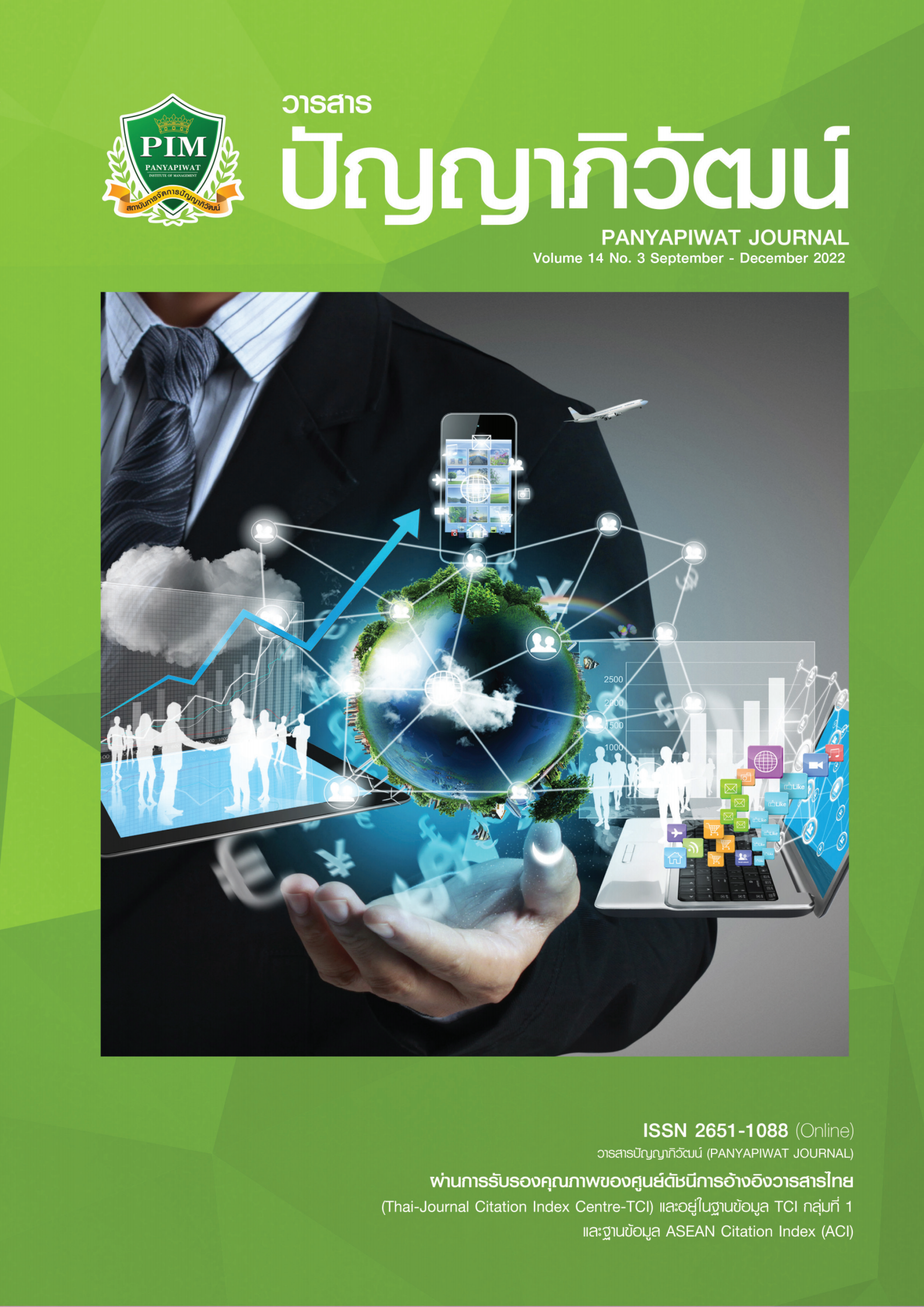ภาวะผู้นำดิจิทัลของผู้บริหารสถานศึกษาที่ส่งผลต่อประสิทธิผลการปฏิบัติงานของครูในโรงเรียนประถมศึกษา สังกัดสำนักงานเขตพื้นที่การศึกษาประถมศึกษาชัยภูมิ เขต 2
Main Article Content
บทคัดย่อ
การวิจัยนี้มีวัตถุประสงค์เพื่อ 1) ศึกษาระดับภาวะผู้นำ ดิจิทัลของผู้บริหารสถานศึกษาและระดับประสิทธิผลการปฏิบัติงานของครู 2) ศึกษาความสัมพันธ์ระหว่างภาวะผู้นำดิจิทัลของผู้บริหารสถานศึกษากับประสิทธิผลการปฏิบัติงานของครู และ 3) ศึกษาปัจจัยภาวะผู้นำดิจิทัลของผู้บริหารสถานศึกษาที่ส่งผลต่อประสิทธิผลการปฏิบัติงานของครู กลุ่มตัวอย่างในการวิจัย คือ ผู้บริหารสถานศึกษา 35 คน และครู 303 คนรวม 338 คน เครื่องมือที่ใช้ในการวิจัยเป็นแบบสอบถาม มีค่าความเชื่อมั่น 0.97 โดยทำการวิเคราะห์ข้อมูลทางสถิติด้วยโปรแกรมคอมพิวเตอร์สำเร็จรูป เพื่อหาค่าสัมประสิทธิ์สหสัมพันธ์ และวิเคราะห์ถดถอยพหุคูณแบบขั้นตอน ผลการวิจัยพบว่า 1) ภาวะผู้นำ ดิจิทัลของผู้บริหารสถานศึกษาโดยรวมอยู่ในระดับมาก และประสิทธิผลการปฏิบัติงานของครูโดยรวมอยู่ในระดับมาก 2) ความสัมพันธ์ระหว่างภาวะผู้นำดิจิทัลของผู้บริหารสถานศึกษากับประสิทธิผลการปฏิบัติงานของครูมีความสัมพันธ์ในทางบวกอย่างมีนัยสำคัญทางสถิติที่ระดับ 0.01 และ 3) ภาวะผู้นำดิจิทัลที่เป็นตัวพยากรณ์ประสิทธิผลการปฏิบัติงานของครูมี 2 ด้าน คือ ด้านสมรรถนะทางเทคโนโลยี (X3) และด้านวิถีการเรียนรู้เชิงดิจิทัล (X1) มีค่าสัมประสิทธิ์สหสัมพันธ์พหุคูณเท่ากับ 0.681 และค่าสัมประสิทธิ์การทำนายหรืออำนาจพยากรณ์ร้อยละ 46.40 อย่างมีนัยสำคัญทางสถิติที่ 0.01 สมการพยากรณ์ในรูปคะแนนดิบ Y = 2.007 + 0.688 (X3) - 0.156 (X1) สมการพยากรณ์ในรูปคะแนนมาตรฐาน (Standardized Score) Z(Y) = 0.795 Z(X3) - 0.161 Z(X1)
Article Details

อนุญาตภายใต้เงื่อนไข Creative Commons Attribution-NonCommercial-NoDerivatives 4.0 International License.
“ข้าพเจ้าและผู้เขียนร่วม (ถ้ามี) ขอรับรองว่า บทความที่เสนอมานี้ยังไม่เคยได้รับการตีพิมพ์และไม่ได้อยู่ระหว่างกระบวนการพิจารณาลงตีพิมพ์ในวารสารหรือแหล่งเผยแพร่อื่นใด ข้าพเจ้าและผู้เขียนร่วมยอมรับหลักเกณฑ์การพิจารณาต้นฉบับ ทั้งยินยอมให้กองบรรณาธิการมีสิทธิ์พิจารณาและตรวจแก้ต้นฉบับได้ตามที่เห็นสมควร พร้อมนี้ขอมอบลิขสิทธิ์บทความที่ได้รับการตีพิมพ์ให้แก่สถาบันการจัดการปัญญาภิวัฒน์หากมีการฟ้องร้องเรื่องการละเมิดลิขสิทธิ์เกี่ยวกับภาพ กราฟ ข้อความส่วนใดส่วนหนึ่งและ/หรือข้อคิดเห็นที่ปรากฏในบทความข้าพเจ้าและผู้เขียนร่วมยินยอมรับผิดชอบแต่เพียงฝ่ายเดียว”
เอกสารอ้างอิง
Agharuwhe, A. A. (2013). Effects of teachers’ effectiveness on students’ academic performance in public secondary schools; Delta State-Nigeria. Journal of Educational and Social Research, 3(3), 105-111.
Buachu, T., & Buachu, T. (2019). The status of digital leadership of education management administrators. Journal of Educational Studies, 13(2), 285-294. [in Thai]
Bumrungpukdee, N. (2020). The relationship between leadership in information technology of school administrators and school effectiveness under the local administrative organization in Sakon Nakhon Province [Unpublished master’s thesis]. Sakon Nakhon Rajabhat University. [in Thai]
Chaemchoy, S. (2015). Technology leadership: Leading technology into 21st century school. Journal of Education Naresuan University, 17(4), 216-224. [in Thai]
Emmanouil, K., Osia, A., & Paraskevi, I. L. (2014). The impact of leadership on teachers’ effectiveness. The International Journal of Humanities and Social Science, 4(7), 34-39.
Gibson, J. L., Ivancevich, J. M., & Donnelly J. H. (1994). Organizations structure, process, behavior. Business Publications.
Hague, C., & Payton, S. (2010). Digital literacy across the curriculum. Futurelab.
Hong Kong Education City. (2005). Chief executive’s Award for Teaching Excellence Teachers Association (ATETA) and Hong Kong Association for Computer Education (HKACE). http://www.hkedcity.net/article/ec-hot-post/23
International Society for Technology in Education (ISTE). (2009). National educational technology standards for administrators. http://www.iste.org/standards/ISTE-standards-for-administrators
Jeewattana, S. (2012). Constructing ICT leadership indicators for personnel in basic education institutions [Unpublished doctoral dissertation]. Rajabhat Maha Sarakham University. [in Thai]
Kaensa, N., & Amornpan, S. (2017). Educational technology teacher development program for educational institution under the office of Roi-Et Primary Education Service Area Office 2. Journal of Educational Administration and Supervisor, Mahasarakham University, 8(3),
-59. [in Thai]
Keesookpun, E. (2016). School management in digital era. http://www.pracharathschool.go.th/skill/detail/52232 [in Thai]
Kozloski, K. C. (2006). Principal leadership for technology integration: A study of principal technology leadership [Unpublished doctoral dissertation]. Drexel University.
Krejcie, R. V., & Morgan, D. W. (1970). Determining sample size for research activities. Educational and Psychological Measurement, 30(3), 607-610.
Laitho, T. (2017). Study the relationship between technology leadership with innovative learning skills of school administrators under the Office of Uttaradit Primary Education Area 2 [Unpublished master’s thesis]. Naresuan University. [in Thai]
Ministry of Interior. (2007). Computer-related crime act B.E. 2550. http://www.moi.go.th/image/rule_computer/law-comter1.pdf [in Thai]
Nandilok, J. (2013). School leadership administrators affecting teacher effectiveness under the Office of Kalasin Primary Educational Service Area 1 [Unpublished master’s thesis]. Khon Kaen University. [in Thai]
Office of Chaiyaphum Primary Education Service Area 2. (2020). Performance report of fiscal year B.E. 2020. Office of Chaiyaphum Primary Education Service Area 2. [in Thai]
Office of the Basic Education Commission. (2010). Teacher competency assessment guide Office of the Basic Education Commission B.E. 2010. Office of the Basic Education Commission. [in Thai]
Office of the Basic Education Commission. (2019). Education Management Information System: EMIS. https://data.bopp-obec.info/emis/school.php?Area_CODE=3602 [in Thai]
Office of the Education Council. (2020). Report on studying online in the era of COVID-19: Crisis or opportunity for Thai education. Electronic books ONEC.
Office of the Teacher Civil Service and Educational Personnel Commission. (2019). Criteria and methods evaluate performance. https://wow.in.th/6H25Y [in Thai]
Phimsawat, A. (2019). A study of administrator leadership affecting teachers’ performance under the Secondary Educational Service Area Office 31 [Unpublished master’s thesis]. Nakhon Ratchasima Rajabhat University. [in Thai]
Redish, T., & Chan, T. C. (2006). Technology leadership: Aspiring administrators’ perceptions of their leadership preparation program [Unpublished doctoral dissertation]. Kennesaw State University.
Sirisookslipa, S., Ariratanaa, W., & KeowNgangb, T. (2015). The impact of leadership styles of school administrators on affecting teacher effectiveness. Procedia Social and Behavioral Sciences, 186(1), 1031-1037.
Sirisuk, P. (2020). The creative roles of school director to achievement of classroom management of teachers in 4.0 era. Journal of Education, Prince of Songkla University, Pattani Campus, 31(2), 10-24. [in Thai]
Somprach, K. (2019). Leadership and the quality of education. Faculty of Education Khon Kaen University. [in Thai]
Tammasaeng, M. (2015). Educational technology leadership model of educational institution administrators specialized in disability. Journal of the Suan Dusit Graduate School, 11(2), 7-16. [in Thai]
The Faculty of Education. (2010). Leading the organization and information technology educational administration. Chulalongkorn University Printing House. [in Thai]
Toamnart, S. (2020). Skills in using digital technology for teaching and learning management. Office of Chaiyaphum Primary Education Service Area 2. [in Thai]
Wechayaluck, N. (2016). Classroom management for supporting learning in the 21st century. Graduate Studies Journal, 13(61), 11-20. [in Thai]


